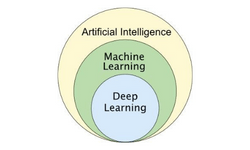Development and public release of ChatGPT and other artificial intelligence (AI) based chatbots has cast AI into the public spotlight even though it has been a subject of modern academic research since the 1940’s. Over the years, we’ve written several articles on artificial intelligence and intellectual property law. Way back in 2017, we pondered the question of whether a work generated by AI is protected under copyright law, concluding that it would not be protected. Indeed, the U.S. Copyright Office recently wrote that it does not consider AI-generated graphical works copyrightable subject matter because they are not the product of human authorship.
Artificial intelligence systems are developed to perform complex tasks in a manner similar to how humans solve problems. To accomplish this goal, computer scientists have developed algorithms, which are applied to very large data sets of text or images with the goal of recognizing patterns and making predictions. This is the basis of so-called “machine learning.” You may wonder where these large data sets originate. Of course, the Internet is the mother of data sets and machine learning takes advantage of this “free” and accessible resource. But what about data that is protected under copyright and other intellectual property law, which is not free but located on the Internet? You can see where this is going. Here come the lawsuits.
In early February 2023, Getty Images (US), Inc. sued Stability AI, Inc. in Delaware federal court for copyright infringement and related counts. This followed the filing of a similar lawsuit in London. Getty Images, if you don’t know, is one of the largest stock image repositories in the world. It hires or otherwise engages thousands of photographers to create millions of images, which it licenses and sells to the public. Getty’s images are available online through its websites, gettyimages.com and istock.com. Stability AI is an artificial intelligence for-profit company that created an image-generating model called Stable Diffusion, which generates computer-synthesized images in response to a user’s text prompts. Stable Diffusion is available as open source or a commercial product called DreamStudio whose underlying engine is the Stable Diffusion model. According to Getty Images’ complaint, “DreamStudio enables users to obtain images from the Stable Diffusion model on their own personal computers without the need for software installation or coding knowledge, and Stability AI charges fees for that service.”
Getty contends that Stability AI copied, encoded, and altered billions of text-and-image pairings for purposes of training its AI model. According to the complaint, “Stability AI followed links… to access specific pages on Getty Images’ websites and copied many millions of copyrighted images and associated text. Such copying was done without Getty images’ authorization and in violation of the express prohibitions against such conduct contained in its websites’ terms of use.” Getting Images’ complaint offers considerable evidence to support this contention.
Getty asserts claims of copyright infringement, providing false copyright management information, removal or alteration of copyright management information, trademark infringement, unfair competition, and various related state law claims against Stability AI. Stability AI has yet to respond to the complaint but will likely assert that a fair use defense among others. On its part, Getty Images says it’s not trying to stifle the development of AI. In a press release, it states:
Getty Images believes artificial intelligence has the potential to stimulate creative endeavors. Accordingly, Getty Images provided licenses to leading technology innovators for purposes related to training artificial intelligence systems in a manner that respects personal and intellectual property rights. Stability AI did not seek any such license from Getty Images and instead, we believe, chose to ignore viable licensing options and long-standing legal protections in pursuit of their stand-alone commercial interests.
In other words, Getty just wants to be paid.
We’re bound to see more of these lawsuits. We will continue to follow this lawsuit and related developments.
* Image by Lollixzc and licensed under Creative Commons License
— Adam G. Garson, Esq.


